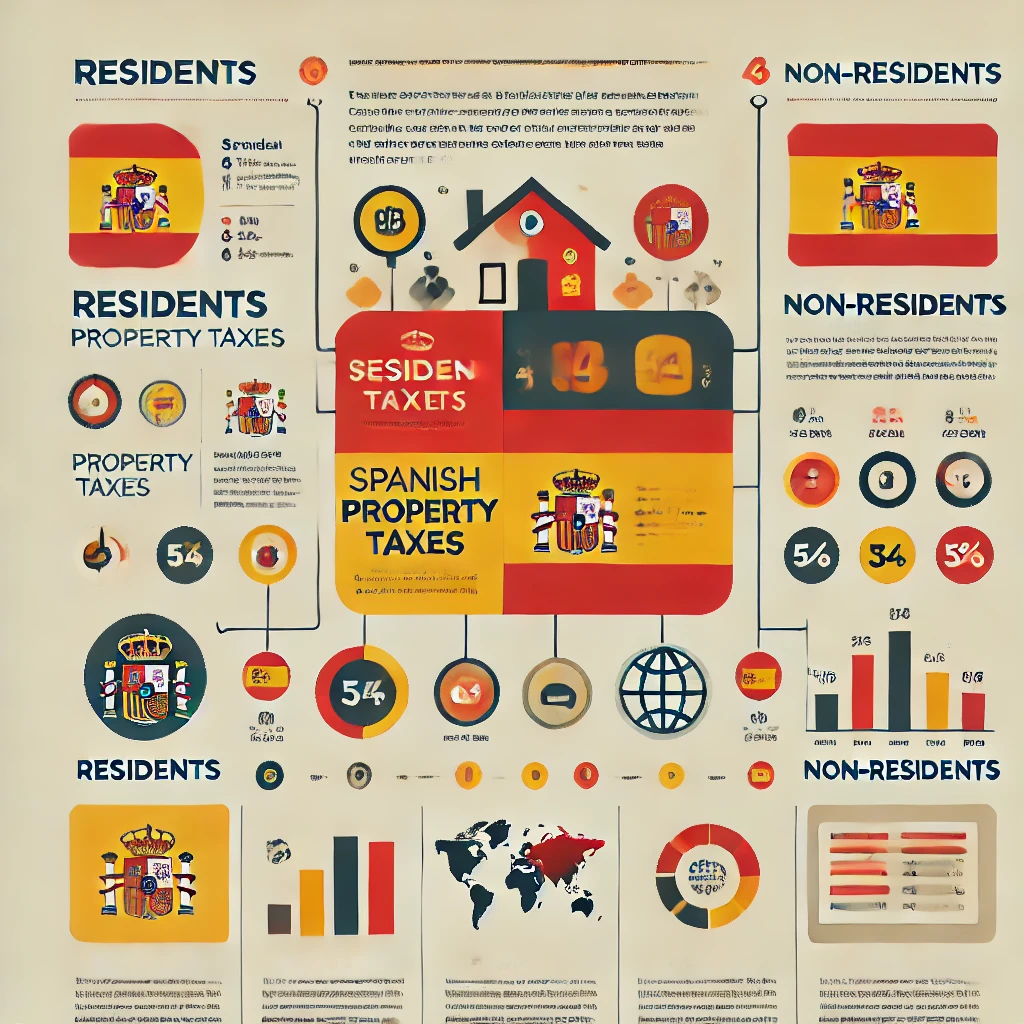What taxes need to be considered when purchasing real estate in Spain?

- What are the differences between residents and non-residents when buying real estate in Spain?
- What are the property maintenance taxes in Spain?
Differences between residents and non-residents
To begin with, it is necessary to distinguish between the terms "resident" and "non-resident." These concepts relate to property owners in Spain and have different tax implications. Residents are individuals who meet at least one of the following criteria:
- They spend more than 183 days a year in Spain, and this period can be non-consecutive.
- They designate Spain as the main center of their life interests, which includes having family or a primary business in the country.
However, it is important to understand that simply purchasing property in Spain does not automatically grant resident status. Many foreign owners remain under the jurisdiction of their home country. More detailed information about the tax obligations of Russian citizens can be found in other sources.
Legal advice
It is also worth noting that the information presented in this article is for informational purposes only and does not substitute for professional legal advice. For an accurate assessment of the tax burden in each individual case, it is recommended to consult specialists in this field.
Taxes when purchasing real estate
Regarding tax obligations when purchasing real estate in Spain, at this stage, all buyers, both residents and non-residents, face the same taxes. Tax payments are required immediately after signing the purchase agreement, and without fulfilling these obligations, the transaction cannot be legally registered.
Tax rates vary depending on the category of the property being purchased — it can be residential or commercial, new or secondary market, as well as the location of the property. When purchasing a property on the secondary market, the buyer must pay a property transfer tax, which is referred to asproperty transfer tax (ITP)The size of this tax depends on the region. On average, it is about 8% across the country; however, in Catalonia, the rate can reach 10%, while in the Canary Islands, it is only 6.6%.
Primary market
As for the primary market, a value-added tax (VAT) is applied, which is fixed at 10% for all areas of Spain. In the case of purchasing a plot of land or commercial property, this tax increases to 21%. These are just the main and most significant taxes you will have to pay when acquiring real estate in Spain.
Additional expenses
In addition to this, your expenses may include:
- stamp duty,
- the fee for registering property rights,
- notary services.
In total, these costs amount to about 2-4% of the purchase price of the property.
Mortgage and total costs
If you are planning to take out a mortgage, be prepared for additional costs at the time of the transaction to increase by several percent. Remember that the amount stated in the sales listings does not include tax payments. Therefore, feel free to add about 13-15% to the price of the property to get a complete picture of your expenses.
Taxes on property maintenance in Spain
Before making a decision to purchase property in this country, it is crucial to carefully analyze the financial obligations you will need to take on for its maintenance.
29 January 2025
29 September 2025
9 October 2024
9 October 2024
29 January 2025

Property tax IBI
The first and most significant tax that every property owner, including foreign citizens, is required to pay is known as the property tax IBI.Property TaxThe amount is calculated based on the cadastral value, which is usually significantly lower than the actual market price. Each municipality sets its own rules and deadlines for paying this tax, so the rates can vary widely.
The tax rates for this tax depend on the region and range from 0.4% to 1.16%. For example, in popular areas of Spain, the following average IBI tax rates are shown, taking into account the dates of the cadastral assessments:
- Valencia: 1.07% (1998 estimate)
- Girona: 0.88% (1990 estimate)
- Alicante: 0.84% (1996 estimate)
- Barcelona: 0.82% (2002 estimate)
- Murcia: 0.79% (2002 estimate)
- Malaga: 0.72% (2009 estimate)
Typically, owners of resort properties in Spain receive annual bills ranging from 200 to 800 euros. However, if you plan to purchase a luxury property in a sought-after area, the IBI tax amount may double.
Income tax IRNR
The next tax you need to pay isincome tax IRNR (Income Tax for Non-ResidentsThis tax must be paid only by non-residents, and its amount is determined by your status in the country and how you use your property.
For non-residents who do not rent out their property, the tax base is set at 2% of the cadastral value, or 1.1% if the assessment was conducted after 1994. For citizens of the European Union, Iceland, and Norway, the tax rate is 19%, while for other foreign citizens, it is 24%.
Example of tax calculation
For example, let's consider how property tax is calculated for citizens of Russia: if the cadastral value of an apartment in Malaga is 100,000 euros, then the tax base will be 1,100 euros, and the income tax IRNR at a rate of 24% will amount to 264 euros (24% of 1,100 euros).
For foreign owners who rent out their property, the IRNR income tax is calculated based on the annual rental amount. The rates remain unchanged: 19% for residents of the European Union and 24% for all other non-residents. It is important to note that timely tax payments and proper documentation can significantly ease the process of property ownership and avoid potential penalties. Therefore, it is advisable to carefully review the current requirements and obligations before making a purchase to avoid unexpected financial expenses.

Conclusion
In conclusion, I would like to emphasize that buying real estate in Spain is a multifaceted process that requires careful preparation. We have examined important aspects related to the status of residents and non-residents, as well as the taxation that applies both at the time of purchase and during the operation of the property.
To successfully invest in Spanish real estate, it is essential to thoroughly study all financial obligations that arise from such transactions. Among the most important taxes that buyers should consider are:
- Value added tax
- Tax on the transfer of ownership rights- which may vary depending on the region.
Moreover, it should be noted that property taxes can also vary significantly, which needs to be taken into account when calculating the overall budget.
Recommendations
In this context, I recommend that every potential buyer consult with professionals in real estate and tax consulting. They can provide personalized advice and help understand all the nuances of local legislation, which will significantly simplify the process and help avoid mistakes.
Spain offers excellent investment opportunities, but it's important to have a complete picture and accurately assess future costs.
Result
I hope this information has been helpful to you and will assist you in confidently taking a step towards your Spanish dream of real estate. Remember thatfinancial literacyUnderstanding all the nuances is the key to successful investment and a pleasant life in sunny Spain!
Tags
Comment
Popular Posts
29 September 2025
402
9 October 2024
1488
9 October 2024
9948
29 January 2025
1541
Popular Offers

Subscribe to the newsletter from Hatamatata.com!
Subscribe to the newsletter from Hatamatata.com!
I agree to the processing of personal data and confidentiality rules of Hatamatata













